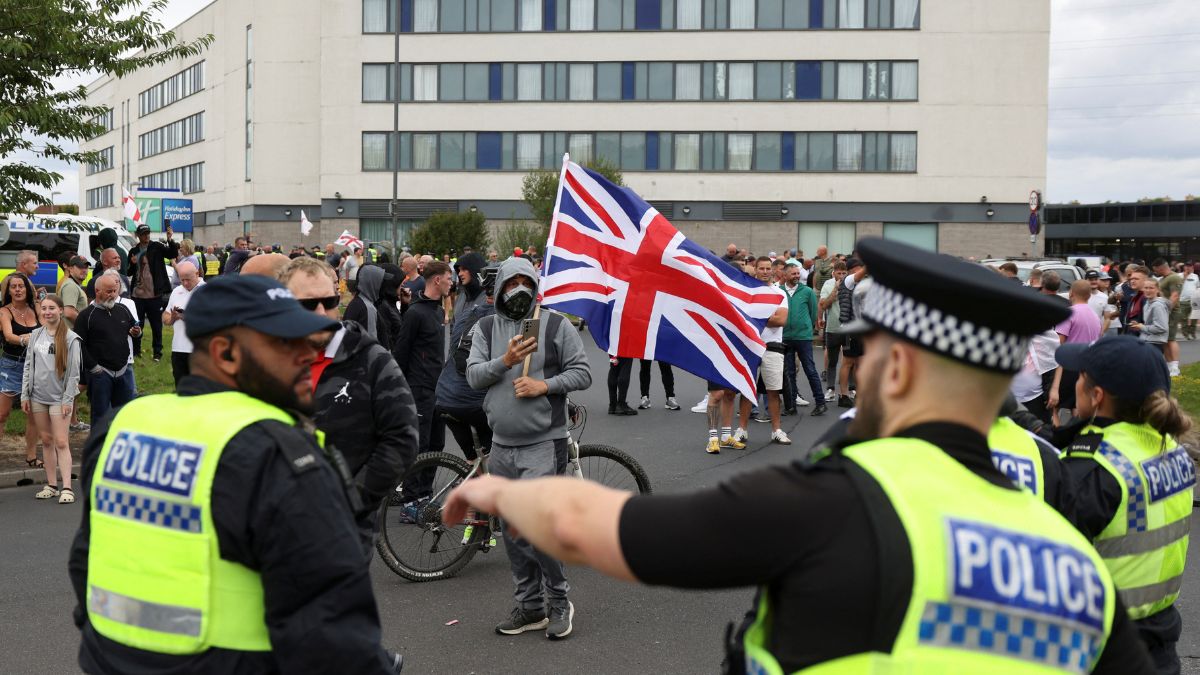A confidential report by the UK’s National Police Chiefs’ Council (NPCC) has turned heads after it was cited in a news article by The Mail on Sunday.
The report alleges that ’extremist’ elements within the British Hindu community have formed ties with far-right organisations based on ‘shared hostility toward Muslims’.
Additionally, it suggests that these groups may be influencing British elections by advising Hindu voters on which political parties to support or avoid.
The document, reportedly compiled by the National Community Tension Team under the NPCC, warns that the rise of Hindutva — a political ideology distinct from mainstream Hinduism — could strain interfaith relations in the UK.
This ‘concern’ was previously noted in a Home Office review on extremism, which marked the first time Hindutva had been officially mentioned as an issue in Britain.
The NPCC study links Hindutva supporters to the violent clashes that occurred in Leicester in 2022 , attributing some of the unrest to the spread of disinformation.
What are the allegations?
One of the key claims in the report is that certain factions within the Hindutva movement in the UK have aligned themselves with far-right activists, including British extremist Tommy Robinson.
According to the document, Robinson has attended meetings with Hindu groups to support anti-Muslim initiatives, and his presence was welcomed by some British Hindus and Indian media outlets.
The report also suggests that elements of Hindutva ideology have resonated with European far-right figures, including Norwegian terrorist Anders Breivik , who cited Hindutva in his manifesto.
Further, the report raises concerns about political interference, citing incidents from the 2019 UK general election . It claims that Hindu voters in the UK were targeted with messages on WhatsApp urging them to vote for the Conservative Party instead of Labour, which was then led by Jeremy Corbyn.
The report also highlights concerns regarding the use of religious slogans in political and social conflicts.
It notes that the phrase “Jai Shri Ram” (Hail Lord Ram), traditionally a Hindu religious chant, has been weaponised by extremists to assert dominance over other communities, drawing a parallel to how “Allahu Akbar” (God is Great) has been exploited by Islamist radicals.
Another point of contention in the report is the claim that certain Bollywood films have contributed to interfaith tensions in Britain. It points to recent protests by Sikh groups against the film _Emergency_ , which they believe portrays Sikhs in a negative light.
How have Hindu organisations responded?
British Hindu groups have strongly condemned the report, calling it misleading, baseless, and dangerous. INSIGHT UK, an advocacy organisation, announced plans to file a complaint with The Mail on Sunday and the Independent Press Standards Organisation (IPSO).
They have also requested access to the report through a Freedom of Information (FOI) request. “It is baseless and without evidence. This article is making Hindus feel less safe in the UK,” an INSIGHT UK spokesperson stated.
The Times of India quoted Neeraj Patil, chair of Hindus for Labour, rejected the claims outright, arguing, “No credible Hindu organisation in the UK, or major Hindu confederation, has aligned itself with any right-wing British Hindu group. Those making such claims should be asked to provide concrete evidence. These narratives are part of an anti-Hindu agenda promoted by certain elements who resent the growing influence of British Hindus.”
Kuldeep Shekhawat, president of OFBJP-UK, defended the organisation’s right to campaign in British elections. “We are British Hindus, so we can campaign for who we like. How can that be interference?” he asked, quoted by The Times of India.
Meanwhile, the Hindu Community Organisation Groups Leicester criticised the report’s linkage of Hindutva to Breivik, calling it “offensive” and “highly inflammatory.”
What has the political response been?
Conservative MP Bob Blackman has called for the government to release the full NPCC report, stating that it must be scrutinised publicly.
He pointed out that, despite the report blaming Hindu extremism for the Leicester riots, Hindu homes and temples suffered disproportionate attacks compared to Muslim homes and places of worship.
“I asked the Govt to release the full report so we can scrutinise it,” Blackman stated in a post on X (formerly Twitter).
I raised the NPCC's report which blamed Hindu extremism for the Leicester riots in 2022.
— Bob Blackman (@BobBlackman) March 31, 2025
This is despite the fact that;
105 Hindu homes were attacked, 0 Muslim homes.
2 Hindu temples were attacked, 0 Mosques.
I asked the Govt to release the full report so we can scrutinise it. pic.twitter.com/xHTjmPy1qu
The report’s claims have fuelled a broader discussion on how different ideological movements are classified as extremism in the UK, with critics questioning whether Hindutva is being unfairly equated with far-right radicalism.
Daily Mail quoted Hadiya Masieh, founder of the counter-extremism group Groundswell, who stated that most Hindus do not support Hindutva and warned against misrepresenting the community.
“Hindutva is not supported by most mainstream Hindus, who will always say it is not representative of Hinduism,” she said. She also highlighted that the Leicester riots were driven by both Hindu and Muslim extremists rather than one-sided aggression.
Also Watch:
With inputs from agencies


)

)
)
)
)
)
)
)
)



